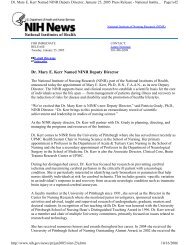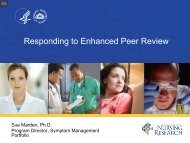Minutes - National Institute of Nursing Research - National Institutes ...
Minutes - National Institute of Nursing Research - National Institutes ...
Minutes - National Institute of Nursing Research - National Institutes ...
You also want an ePaper? Increase the reach of your titles
YUMPU automatically turns print PDFs into web optimized ePapers that Google loves.
III.OVERVIEW OF THE INTRAMURAL RESEARCH PROGRAM—Dr. RaymondDionne, Scientific Director, Intramural <strong>Research</strong> Program (IRP)Dr. Dionne described training opportunities <strong>of</strong>fered by the IRP, both for extramural andintramural scientists. <strong>Research</strong> Methodology Boot Camps, which are administered by theFoundation for Advanced Education in the Sciences (FAES), <strong>of</strong>fer to extramural scientists 1-week courses <strong>of</strong> didactic and laboratory training. Topics rotate based on interest: the past fewboot camps have focused on pain research, whereas the upcoming boot camp, as reported by Dr.Grady, will focus on sleep and fatigue. The boot camps have garnered highly positiveevaluations and enthusiasm from speakers and students. Extramural scientists can also participatein the Summer Genetics <strong>Institute</strong>, which is now an intense, 1-month, full-time experience oncampus. The <strong>Institute</strong>, which is also administered by FAES, has trained more than 230 nursetrainees from 2000 through 2011, and <strong>Institute</strong> alumni have published more than 65 peerreviewedpublications based on research supported by NIH grants. NINR is obtaining clearancefrom the Office <strong>of</strong> Management and Budget (OMB) to conduct an evaluation, including a survey<strong>of</strong> all past trainees.Intramural training opportunities include post-baccalaureate training, where trainees serve 1 to 2years as research associates and receive didactic, hands-on, and mentored training in thelaboratory and on a clinical protocol. Expected outcomes for post-baccalaureate training includeauthorship on an abstract and one or more manuscripts, as well as admission to graduate school.Also <strong>of</strong>fered is postdoctoral training, which is the traditional intramural training mechanism.Postdoctoral trainees in the NINR IRP serve 2 to 3 years as associate investigators and receivedidactic, hands-on, and mentored training with an emphasis on molecular genetics methods.10












